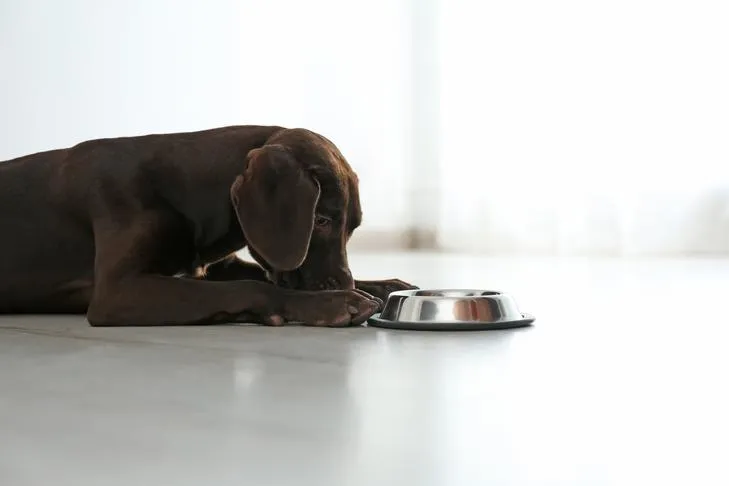An upset stomach in dogs, characterized by decreased appetite, nausea, diarrhea, and vomiting, can be a worrying experience for pet owners. While immediate veterinary consultation is crucial for any serious health concerns, a bland, easily digestible diet can provide significant relief and support your dog’s recovery. This guide focuses on the best foods to offer your canine companion when their stomach is feeling unsettled, ensuring they receive the necessary nutrition while their digestive system heals.
Understanding Your Dog’s Upset Stomach
Similar to humans, dogs can experience occasional digestive distress. Mild symptoms like gas, nausea, constipation, and diarrhea can often be managed with dietary adjustments. However, it’s vital to remember that these symptoms can sometimes indicate a more serious underlying health issue. Always consult your veterinarian before implementing any dietary changes or attempting home treatment. These bland diet recipes are intended for use only after ruling out more severe conditions and in consultation with your vet.
It’s also important to note that senior dogs or those with pre-existing conditions such as diabetes, cancer, or allergies may require specialized nutritional support beyond a simple bland diet. Always discuss your dog’s specific needs with your veterinarian.
Best Foods for Dogs With Upset Stomachs
When your dog is suffering from a mild upset stomach, opt for bland, easily digestible foods. These options are generally well-tolerated, provide essential nutrients, and can help regulate appetite and bowel movements.
Boiled Chicken and Rice
Chicken and rice are foundational ingredients in many commercial dog foods for good reason – they are mild and easy on a dog’s digestive system. Preparing this simple meal at home is straightforward. You’ll need boneless, skinless chicken breasts and rice. While brown rice is more nutritious, white rice is often preferred for upset stomachs due to its blandness. Avoid adding oils, butter, or seasonings, as these can further irritate your dog’s stomach. Ensure the chicken is thoroughly cooked and cut into small, bite-sized pieces.
Shredded Chicken
Plain, unseasoned, boiled, and shredded chicken is not only easy to digest but also serves as an appealing option for dogs with a diminished appetite. It is a rich source of essential vitamins, minerals, fats, and amino acids, making it an excellent choice for a convalescing dog. Cooked chicken can be stored in the refrigerator for 3-4 days or frozen for up to six months.
 A Cavalier King Charles Spaniel standing next to its food bowl at home. AVAVA via Getty Images
A Cavalier King Charles Spaniel standing next to its food bowl at home. AVAVA via Getty Images
Plain Pumpkin
Unseasoned pumpkin can offer significant digestive health benefits for dogs. Its high fiber content aids in regulating the digestive system. Cooked, peeled, unsalted, and unseasoned pumpkin provides beneficial ingredients like vitamin E, iron, and potassium, offering a nutritional boost and digestive support. Veterinarians typically recommend one to four tablespoons of pumpkin per serving, depending on the dog’s size. Canned pumpkin is a convenient option, provided it is pure and unseasoned. Crucially, avoid pumpkin pie filling, as the added spices and sugars can exacerbate stomach upset.
Bone Broth
Bone broth is a very mild, liquid meal that is gentle on sensitive canine stomachs. It can also be used to add moisture and flavor to dry food, encouraging dogs with poor appetites to eat. To prepare bone broth for your dog, fill a slow cooker with beef marrow bones or bones rich in cartilage, such as turkey or chicken legs. Cover the bones with water, cook on low for 20-24 hours, then cool in the refrigerator. Skim off the hardened fat layer before serving. The remaining jelly-like broth can be stored in the fridge or frozen in ice cube trays for later use. Ensure all bones are removed before serving, and consider straining the broth to eliminate any small bone fragments.
 German Shorthaired Pointer puppy laying down next to its bowl indoors. ©New Africa – stock.adobe.com
German Shorthaired Pointer puppy laying down next to its bowl indoors. ©New Africa – stock.adobe.com
Meat-Based Baby Food
Certain types of meat-based baby food are frequently used by veterinary emergency hospitals due to their digestibility. Stage II meat-based options, such as chicken, lamb, or turkey, can be a good choice, provided they do not contain any ingredients toxic to dogs, like garlic or onion powder.
Foods to Avoid
While some human foods can be beneficial, others can worsen your dog’s condition or pose health risks. It’s essential to avoid the following, especially when your dog is experiencing digestive issues:
- Foods cooked with garlic, oils, or excessive seasonings.
- Milk or dairy products, which can cause vomiting or diarrhea in lactose-intolerant dogs.
- Processed meats like ham, bacon, or pepperoni, due to their high fat and salt content.
Remember, these dietary recommendations are not a substitute for professional veterinary care. A bland diet can help alleviate discomfort and provide necessary nutrients, but always consult your veterinarian before making any changes to your dog’s diet. For more comprehensive information on canine digestive health, explore resources on what dogs can eat with an upset stomach.
